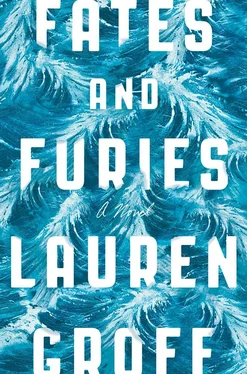Lauren Groff
Fates and Furies
A THICK DRIZZLE FROM THE SKY, like a curtain’s sudden sweeping. The seabirds stopped their tuning, the ocean went mute. Houselights over the water dimmed to gray.
Two people were coming up the beach. She was fair and sharp in a green bikini, though it was May in Maine and cold. He was tall, vivid; a light flickered in him that caught the eye and held it. Their names were Lotto and Mathilde.
For a minute they watched a tide pool full of spiny creatures that sent up curls of sand in vanishing. Then he took her face in his hands, kissed her pale lips. He could die right now of happiness. In a vision, he saw the sea rising up to suck them in, tonguing off their flesh and rolling their bones over its coral molars in the deep. If she was beside him, he thought, he would float out singing.
Well, he was young, twenty-two, and they had been married that morning in secret. Extravagance, under the circumstances, could be forgiven.
Her fingers down the back of his trunks seared his skin. She pushed him backward, walking him up a dune covered in beach-pea stalks, down again to where the wall of sand blocked the wind, where they felt warmer. Under the bikini top, her gooseflesh had taken on a lunar blue, and her nipples in the cold turned inward. On their knees now, though the sand was rough and hurt. It didn’t matter. They were reduced to mouths and hands. He swept her legs to his hips, pressed her down, blanketed her with his heat until she stopped shivering, made a dune of his back. Her raw knees were raised to the sky.
He longed for something wordless and potent: what? To wear her. He imagined living in her warmth forever. People in his life had fallen away from him one by one like dominoes; every movement pinned her further so that she could not abandon him. He imagined a lifetime of screwing on the beach until they were one of those ancient pairs speed-walking in the morning, skin like lacquered walnut meat. Even old, he would waltz her into the dunes and have his way with her sexy frail bird bones, the plastic hips, the bionic knee. Drone lifeguards looming up in the sky, flashing their lights, booming Fornicators! Fornicators! to roust them guiltily out. This, for eternity. He closed his eyes and wished. Her eyelashes on his cheek, her thighs on his waist, the first consummation of this terrifying thing they’d done. Marriage meant forever.
[He’d planned for a proper bed, a sense of ceremony: he’d stolen his roommate Samuel’s beach house, having spent most summers there since he was fifteen, knowing that they hid the key under the hawksbill turtle carapace in the garden. A house of tartan and Liberty print and Fiestaware, thick with dust; the guest room with the lighthouse’s triple blink in the night, the craggy beach below. This was what Lotto had imagined for the first time with this gorgeous girl he’d magicked into wife. But Mathilde was right to agitate for plein-air consummation. She was always right. He would know this soon enough.]
It was over too quickly. When she shouted, the gulls hidden by the dune buckshot the low clouds. Later, she’d show him the abrasion against her eighth vertebra from a mussel shell when he dug her in and dug her in. They were pressed so close that when they laughed, his laugh rose from her belly, hers from his throat. He kissed her cheekbones, her clavicle, the pale of her wrist with its rootlike blue veins. His terrible hunger he’d thought would be sated was not. The end apparent in the beginning.
“My wife,” he said. “Mine.” Perhaps instead of wearing her, he could swallow her whole.
“Oh?” she said. “Right. Because I’m chattel. Because my royal family traded me for three mules and a bucket of butter.”
“I love your butter bucket,” he said. “ My butter bucket now. So salty. So sweet.”
“Stop,” she said. She’d lost her smile, so shy and constant that he was startled to see her up close without it. “Nobody belongs to anybody. We’ve done something bigger. It’s new.”
He looked at her thoughtfully, gently bit the tip of her nose. He had loved her with all his might these two weeks and, in so loving, had considered her transparent, a plate of glass. He could see through to the goodness at her quick. But glass is fragile, he would have to be careful. “You’re right,” he said; thinking, No, thinking how deeply they belonged. How surely.
Between his skin and hers, there was the smallest of spaces, barely enough for air, for this slick of sweat now chilling. Even still, a third person, their marriage, had slid in.
THEY CLIMBED ACROSS THE ROCKS toward the house they’d left bright in the dusk.
A unity, marriage, made of discrete parts. Lotto was loud and full of light; Mathilde, quiet, watchful. Easy to believe that his was the better half, the one that set the tone. It’s true that everything he’d lived so far had steadily built toward Mathilde. That if his life had not prepared him for the moment she walked in, there would have been no them .
The drizzle thickened to drops. They hurried across the last stretch of beach.
[Suspend them there, in the mind’s eye: skinny, young, coming through dark toward warmth, flying over the cold sand and stone. We will return to them. For now, he’s the one we can’t look away from. He is the shining one.]
—
LOTTO LOVED THE STORY. He’d been born, he’d always say, in the calm eye of a hurricane.
[From the first, a wicked sense of timing.]
His mother was beautiful then, and his father was still alive. Summer, late sixties. Hamlin, Florida. The plantation house so new there were tags on the furniture. The shutters hadn’t been screwed down and made a terrific din in the wild first passage of the storm.
Now, briefly, sun. Rain dripped off the sour-orange trees. In the pause, the bottling plant roared five acres across his family’s scrubland. In the hallway, two housemaids, the cook, a landscaper, and the plant’s foreman pressed their ears to the wooden door. Inside the room, Antoinette was aswim in white sheets and enormous Gawain held his wife’s hot head. Lotto’s aunt Sallie crouched to catch the baby.
Lotto made his entrance: goblinesque with long limbs, huge hands and feet, lungs exceeding strong. Gawain held him to the light in the window. The wind was rising again, live oaks conducting the storm with mossy arms. Gawain wept. He’d hit his apex. “Gawain Junior,” he said.
But Antoinette had done all the work, after all, and already the heat she’d felt for her husband was half diverted into her son. “No,” she said. She thought of a date with Gawain, the maroon velvet in the theater and Camelot on screen. “Lancelot,” she said. Her men would be knight-themed. She was not without humor of her own.
Before the storm hit again, the doctor arrived to sew Antoinette back together. Sallie swabbed the baby’s skin with olive oil. She felt as if she were holding her own beating heart in her hands. “Lancelot,” she whispered. “What a name. You’ll be beat up for sure. But don’t you fret. I’ll make sure you’re Lotto.” And because she could move behind wallpaper like the mouse she resembled, Lotto is what they called him.
—
THE BABY WAS EXIGENT. Antoinette’s body was blasted, breasts chewed up. Nursing was not a success. But as soon as Lotto began to smile and she saw he was her tiny image with her dimples and charm, she forgave him. A relief, to find her own beauty there. Her husband’s family were not a lovely people, descendants of every kind of Floridian from original Timucua through Spanish and Scot and escaped slave and Seminole and carpetbagger; mostly they bore the look of overcooked Cracker. Sallie was sharp-faced, bony. Gawain was hairy and huge and silent; it was a joke in Hamlin that he was only half human, the spawn of a bear that had waylaid his mother on her way to the outhouse. Antoinette had historically gone for the smooth and pomaded, the suave steppers, the loudly moneyed, but a year married, she found herself still so stirred by her husband that when he came in at night she followed him full-clothed into the shower as if in a trance.
Читать дальше












